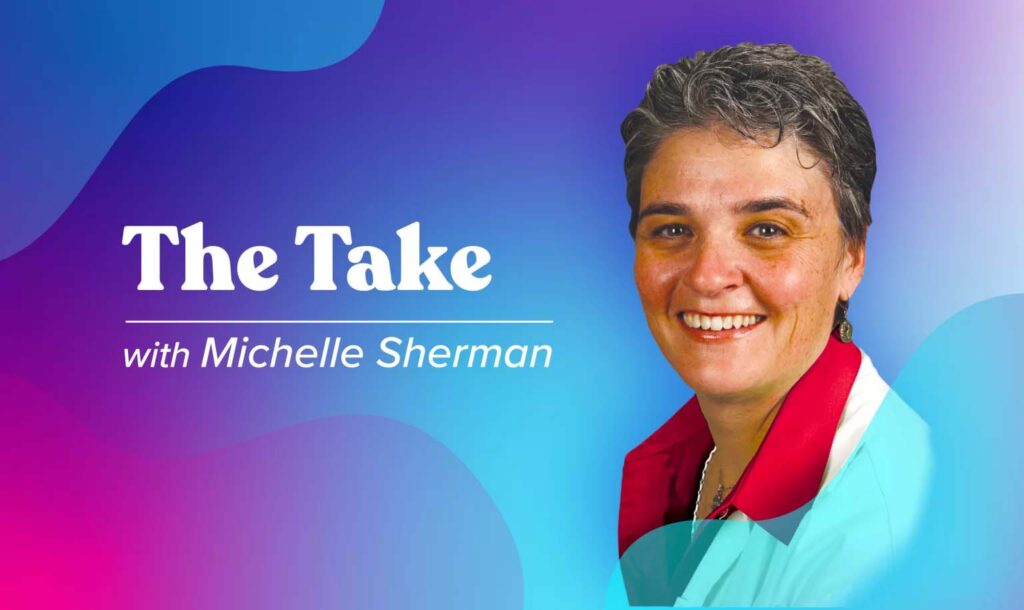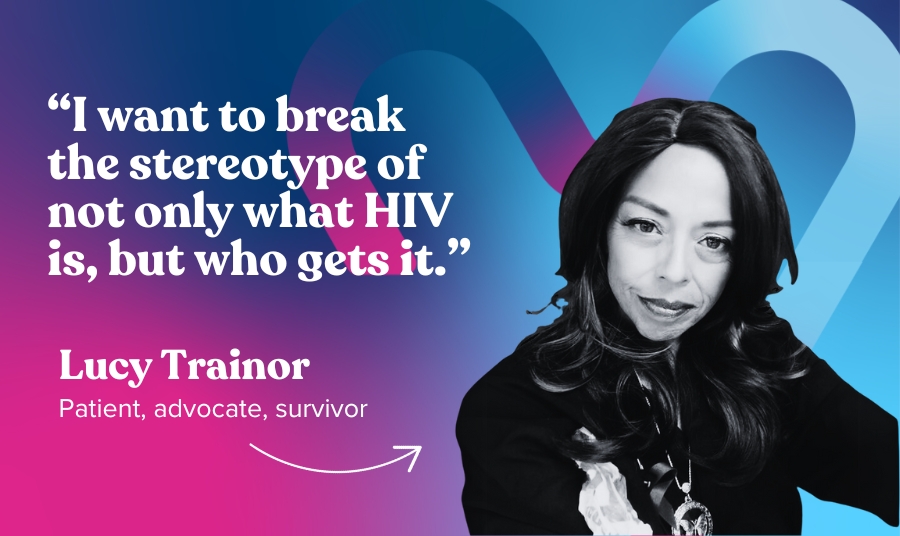Pharmacists continually rank among the top five most trusted professions. Yet their role as key health care providers and critical touchstones during the patient journey is often overlooked. In this month’s “The Take,” Avita’s Glen Pietrandoni chats with internationally known HIV pharmacist Michelle Sherman, founder of the Center for Advanced Pharmacist Care, host of the Conscious Pharmacist Podcast, and president of MichRx Pharmacist Consulting Services*. Read on for a lively discussion about how pharmacists are finally demanding their voices be heard—and why she thinks they’re the health care system’s “best-kept secret.”
Glen: Michelle, we’ve both been pharmacists for a long time, and we’ve fought for recognition of the fact that pharmacists are crucial to patients’ well-being. How does the pharmacy—and the pharmacy team—play a role in health care?
Michelle: As a pharmacist, I’m a firm believer that pharmacists are an integral part of a patient’s health care team. Gone are the days when the pharmacist is standing behind the counter counting pills.
I’ve been working in HIV for the past 30 years, and during my career I’ve seen this complete evolution of the pharmacist, and the pharmacist journey, from that of a pill counter to a health care provider. Over the years, other disciplines like physicians, dentists, and medical providers have been very vocal about what they want from their profession, who they are, and what they do for patients. As pharmacists, we’ve been notoriously bad at that. We’re the best-kept secret in the health care system.
Pharmacists are an integral part of a patient's health care team. Gone are the days when the pharmacist is standing behind the counter counting pills.
- Michelle Sherman
The pharmacist as a patient's "go-to" person
Glen: The best kept secret. Why is that?
Michelle: Because, even way back in the day, the pharmacist was a patient’s go-to person. The pharmacy is very accessible. You can just walk into a community pharmacy and talk to a pharmacist, who can really help guide you [about your health care]. Helping patients navigate the medical system takes a lot of time and patience. When patients are in dire straits often nobody else has the time to do that, but the pharmacist is available.
Traditionally, pharmacists have taken the time to care for patients, manage their drug therapies, and educate them about their meds. We were the unsung heroes of the health care system because nobody knew what we actually did as pharmacists.
This has evolved. Now pharmacy organizations and pharmacists are out there letting our voices be heard. Because of the catastrophically fragmented health care system we have right now, the pharmacist is a key player. So much of a patient’s health care journey includes medications.
I’ll never forget it. Before my dad passed away, he was so sick that he had 10 different doctors literally from his head to his toes. And it was me, his daughter the pharmacist, who was managing all the medications. It was everything I could do to stop them from killing him with all the drug interactions. When patients are seeing different providers for everything, there’s no continuity of access to the medications they’re taking.
Pharmacists play a key role in making our patients feel comfortable, and when our patients feel comfortable, their adherence improves, and their health improves.
- Michelle Sherman
Smoothing the patient—and provider—journey
Glen: There are so many barriers to quality care, especially for vulnerable or underserved patients. How do pharmacists help smooth the health care journey for both patients and providers?
Michelle: If we as a society can’t take care of the most vulnerable people in our population and make sure they have the best access to health care, then we don’t really have a healthy society. This is where the pharmacist plays a key role: Offering a safe place for patients.
So many of the patients we serve are marginalized, whether they’re members of the LGBTQ+ community, homeless, substance users, or anyone who is stigmatized. While community health clinics and FQHCs are usually very compassionate places for them to go, they can often end up having bad experiences at mainstream providers’ offices.
When a patient has access to a pharmacist who makes them feel they’re in a safe place—that they’re not going to be stigmatized and that the pharmacy is going to fight to get them access to the medication that they need—then they know, like, and trust the pharmacist.
It’s really important that the system recognizes this. Pharmacists play a key role in making our patients feel comfortable, and when our patients feel comfortable, their adherence improves, and their health improves.
In terms of providers, we have to educate them about the valuable role a pharmacist plays on their team. Pharmacists located onsite at covered entities are the perfect example because they have access to the patient EHR (Electronic Health Record). As a result, they can really mitigate a lot of the frustrations a provider might have and become an extension of that health care provider. Remember: The pharmacist isn’t taking care activity away from the provider. The pharmacist is working with the physician to enhance patient care.
Helping patients navigate the medical system takes a lot of time and patience. When patiients are in dire straits often nobody else has the time to do that, but the pharmacist is available.
- Michelle Sherman
The Ubuntu philosophy of compassionate pharmacy care
Glen: Let’s switch gears a bit. You’re a big proponent of the Ubuntu philosophy as it pertains to pharmacy care, and you developed a medication therapy management and chronic care management program called the Ubuntu Pharmacist Care Program. What’s that all about?
Michelle: I’m originally from South Africa. Ubuntu is an African philosophy that means “what happens to you happens to me, happens to all of us.” It embodies our connectedness. This philosophy is at the core of the pharmacist care that I provide.
Here’s an example: Say I sit down with a patient and I’m assessing their meds and trying to figure out why they are having all these drug interactions and side effects. Engaging with that patient matters to me; it’s a gift of Ubuntu.
The patient has my undivided attention. When I sit with them, I’m not texting or checking my phone. I’m looking directly at that patient and giving them all my time, which makes them feel very comfortable, relaxed, and trusting. If we can’t get our patients to feel comfortable and trust us, we can’t gather all the information we need to formulate a good plan.
Then I come up with a plan for the patient, who then goes home and makes changes to their regimen or works with their provider to make those changes. When that person gets healthier, this affects their whole family. Maybe they’re able to go back to work, or take care of their children, or do some good in their communities, so that spirit of Ubuntu is passed on.
So, what happens to them matters to me, and it affects me directly if that patient’s outcome is good. But ultimately, when you look at it down the line, they really can affect change within their own family and community.
Glen: How empowering.
Michelle: To that end, I created the Ubuntu Pharmacist Care Program, which is basically taking care of pharmacy patients according to the Ubuntu philosophy.
When we as pharmacists look at ourselves as health care providers, we ask ourselves why we do what we do every day. Through the Ubuntu philosophy, we learn that what happens to the patient happens to us too, and vice versa.
Glen: I always felt like when, as a pharmacist, I built a relationship with the patients and the community, it was a much more rewarding experience for me. At Avita, we’ve built a model of compassionate care—that we treat each patient as an individual and with the respect they deserve.
Michelle: Yes, Avita’s model of compassionate care spans across the company and all of its pharmacies. As a member of the LGBTQ+ community, you can feel that. It’s not just an organization that shows support during Pride month but then doesn’t stand up for the community the rest of the year. Everybody is working together, in partnership with the patients, to help people live healthier lives. Avita as an organization is an example of how the world should be.
Ubuntu is an African philosophy that means "what happens to you happens to me, happens to all of us." It embodies our connectedness.
- Michelle Sherman
Sexual and mental health as components of overall health
Glen: A lot of covered entities are expanding their missions beyond various disease states to put a spotlight on the importance of sexual health. What’s your take on this trend?
Michelle: It’s critical for people to take care of their sexual health. But most providers and people out there don’t even like to say the “S” word, because it’s too terrifying for them. How do we ever think we’re going to end the HIV epidemic if we don’t look at the big picture? Promoting sexual health and prevention is one of the biggest pieces to doing that. We should be encouraging people to take care of their sexual health, not discouraging it. So, I love this campaign.
Glen: What about the emotional well-being of our patients? For example, how does mental health play an important role for HIV positive patients?
Michelle: When we’re caring for HIV or sexual health patients, considering their mental health status and well-being is crucially important. If somebody has mental health challenges—whether it’s uncontrolled schizophrenia, depression, or anxiety—and is trying to quell those symptoms with alcohol or drugs or is just spiraling out of control, then they will usually not be adherent to their HIV meds. Why would we expect patients to take their HIV meds every single day if they’re contemplating not even wanting to live anymore? As pharmacists, we must be astute to some of the mental health signals patients might give us when we’re talking to them.
That’s why any time I work with pharmacy students, I always encourage them to “zip it.” Stop talking and let your patients do all the talking, because that’s how you get the best information. If they do that, we can address those issues and make referrals to a therapist or a mental health provider. That’s our role as pharmacists; there’s so much more we can do than putting pills in a bottle.
It's critical for people to take care of their sexual health. But most providers and people out there don't even like to say the "S" word, because it's too terrifying for them. How do we ever think we're going to end the HIV epidemic if we don't look at the big picture?
- Michelle Sherman
*Michelle has served as a consultant for Avita Pharmacy.
What’s your take? Whether you have an idea for a future guest or topic for our blog post series or would like to comment on the insights of one of our past guests, we’d love to hear from you! Reach out to us on social media on our LinkedIn, Twitter, and Facebook channels.
About Michelle Sherman:
Michelle is an author, speaker, consultant and advisor, pharmacy entrepreneur and innovator, president of MichRx Pharmacist Consulting Services, Inc., internationally recognized HIV specialist pharmacist, and owner of HIV Thrive. She has developed a leading-edge medication therapy management and chronic care management program called the Ubuntu Pharmacist Care Program. Michelle is the host of The Conscious Pharmacist Podcast, and is also Chief Instructor of the Ubuntu Care Academy, which provides online courses and continuing education programs.
Michelle is committed to advancing the recognition of pharmacists as key healthcare providers on patient care teams. Her non-profit, The Center for Advanced Pharmacist Care, advances pharmacists as health care providers. Michelle is an advocate for the LGBTQ+ community, and champions LGBTQ+ rights and access to equitable gender affirming healthcare. She also promotes and advocates for the rights of LGBTQ pharmacists and pharmacy technicians for safe and equal work environments.
About Glen Pietrandoni:
Glen is chief advocacy officer at Avita Care Solutions, an award-winning pharmacy leader, passionate 340B program advocate, and internationally respected HIV and LGBTQ+ activist. He’s deeply engaged in Avita’s mission to advocate for health equity and the 340B Drug Pricing program and works to bring together stakeholders from the pharmaceutical industry and patient advocacy arenas. Through webinars, conferences, Avita’s thought leadership blog series “The Take,” and the organization’s engagement with multiple community and trade associations, Glen leads Avita’s educational and awareness efforts and acts as a voice for its covered entity partners and patients. He continually fights for continued access to the 340B program and advances stigma-free HIV, PrEP, LGBTQ+, and sexual wellness care for underserved patient populations.
Glen recently received Pharmacy Times’ Lifetime Leadership honor at the Next-Generation Pharmacist awards. He serves on the Board of Pharmacy for the State of Illinois, was formerly chairman of the Board of Trustees of AIDS United, and sits on the board of Community Voices for 340B (CV340B). He has earned American Academy of HIV Medicine and Apexus 340B certifications.




